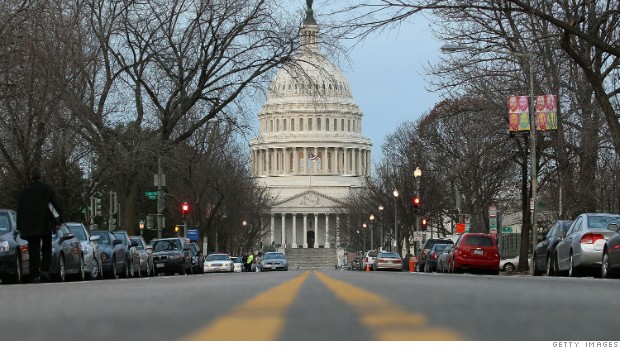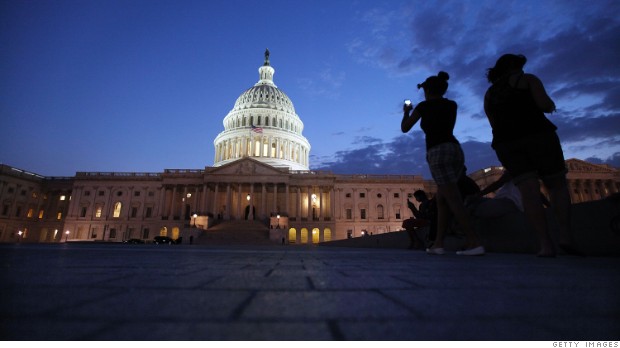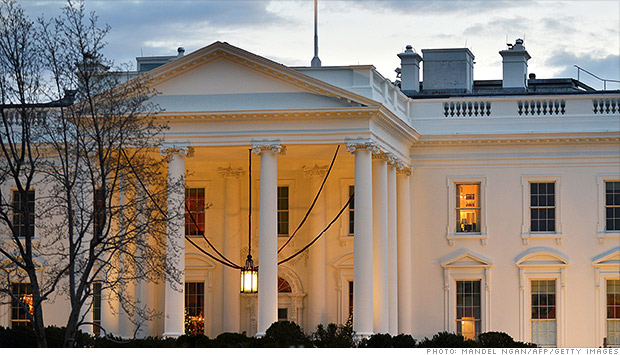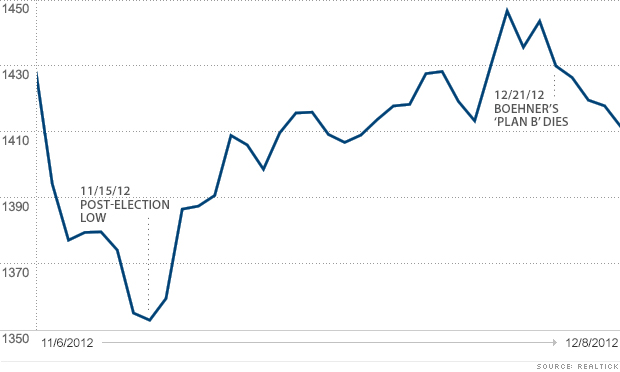
Failure by Congress to avert the tax increases and spending cuts will cause continued uncertainty and headaches for consumers and businesses about paychecks, tax returns, investments and more.
NEW YORK (CNNMoney)
Practically speaking, they likely have a "grace period" of a couple of weeks to pass a bill that wards off the bulk of scheduled tax increases and spending cuts without causing too much damage. But there's no guarantee that they'd be able to forge an agreement quickly.
That means Americans would be living with continued uncertainty about tax and spending policies for an indefinite period in 2013.
And that uncertainty is likely to create problems for tax filers, payroll processors, wage earners, doctors, federal contractors, federal agencies, federal workers and the unemployed -- to name just a few. They are the ones who will pay an increasing price as lawmakers try to redeem themselves and come up with a deal in January or February.
Your paycheck: If you'll be paid in the coming week, your company's payroll processor probably already cut your check. And since the IRS hasn't told the payroll companies yet how much tax to withhold for 2013, they used 2012 withholding rates.
So in that sense, your paycheck in early January won't be much different than what it was in December.
But your paycheck still will be smaller, because the 2% payroll tax holiday is expiring. Starting in January, workers will once again have 6.2% of their wages up to $113,700 withheld to pay for Social Security, up from the 4.2% rate that's been in effect for the past two years.
Effectively that means someone making $50,000 might get about $83 less a month in their paychecks. Someone making twice that would see their pay reduced by roughly $167 a month.
If you're getting a bonus, you'll have more withheld there, too, said Michael O'Toole, senior director of government relations for the American Payroll Association. That's because there's one supplemental withholding rate that applies to bonuses. This year it's 25%, but it's set to rise to 28% on Jan. 1, unless Congress decides to change it.
For paychecks that will be cut during the second, third and fourth weeks of January, payroll processors will follow withholding guidance that the IRS has said it will issue by the end of the year.
If there is no fiscal cliff deal in the next day, and the IRS advises payroll processors to follow 2013 law, paychecks will get smaller because they will have more withheld.
There has been some debate whether Treasury Secretary Tim Geithner has the authority to instruct employers to continue using 2012 withholding tables until further notice. If he does step in, the income tax withheld from paychecks processed in January would not go up.
Such a strategy runs the risk, however, that many wage earners, if not all, could end up being underwithheld for the year. That would be the case if Congress doesn't end up doing anything to avert the cliff in 2013 or lets the Bush-era rates go up on income above a certain threshold.
Your 401(k) and IRA: There's no telling how markets will respond if fiscal cliff gridlock persists.
They had been relatively sanguine. But in the past week, stocks have closed down every day.
Some believe, however, that markets may not move too much on fiscal cliff news -- whether Congress cuts a deal soon or not.
Your 2012 tax return: Here's where things potentially become a dumb mess.
The IRS warned lawmakers that if they don't act to protect the middle class from having to pay the Alternative Minimum Tax for tax year 2012 by Dec. 31, up to 100 million taxpayers may not be able to file their 2012 taxes until late March.
That would mean their refunds will be delayed. And they wouldn't be injecting those refunds into the economy during the first quarter.
Based on Treasury Department records from the past three years, refunds paid during January, February and March combined have ranged from $117 billion to $136 billion.
Government spending: Unless lawmakers avert the so-called sequester, a series of automatic cuts will reduce the budgets of most federal agencies and programs by 8% to 10%.
But that doesn't necessarily mean those cuts would have to occur immediately, according to a former official with the Office of Management and Budget.
Both the White House budget office and federal agencies themselves will have some latitude to postpone the cuts from occurring "for several weeks if necessary," added OMB Watch, a group that monitors the federal budget.
The cuts, if not reversed, would likely lead to unpaid furloughs of federal workers. Agencies must give at least 30 days' notice to employees for a furlough that would last less than 22 work days; 60 days' notice is required for longer furloughs. So far, federal workers have been told to report to work as scheduled on Jan. 2, the day the spending cuts formally kick in.
U.S. economy: Economists expect the U.S. economy would fall into a recession if Congress does nothing to avert the fiscal cliff and lets it stay in effect.
Specifically, the CBO forecasts a drop of 0.5% in real gross domestic product and a 9.1% unemployment rate by the end of next year.
On the bright side, no one expects that Congress would let all fiscal cliff measures have their way with the economy for an extended period.
But there could still be an economic hit if lawmakers push the country over the fiscal cliff temporarily and then pass a fallback deal that primarily averts just some of the tax increases.
For example, Congress may end up passing only a stopgap measure that does not address the automatic spending cuts or raise the country's debt ceiling. In that case, economic growth could be dragged down somewhat in the first half of next year, according to economists at Goldman Sachs.
And remember that the economy is already going to be dragged back somewhat by the expected expiration of the payroll tax cut.
Unemployment benefits: A federal extension of unemployment benefits is set to expire. If Congress does not renew it, workers who lost their jobs after July 1, 2012, will only receive up to 26 weeks in state unemployment benefits, down from as many as 73 weeks in state and federal benefits that have been available in 2012.
As a result, more than 2 million of the long-term unemployed will run out of benefits at the end of this year, according to the National Employment Law Project, an advocacy group.
And another 1 million workers will exhaust their 26 weeks in the first quarter of next year and will not be able to sign up for the federal extension.
If Congress chooses early next year to keep the extension in place, and makes the extension retroactive, many of the 2 million who fell off the rolls may be paid retroactively, said Rick McHugh, a NELP staff attorney.
Doctors' pay: Medicare physicians are facing a nearly 27% cut in their payments for treating Medicare patients because Congress has failed to pass the so-called doc fix to override that scheduled cut, as they usually do.
But here again there may be a few weeks' grace period for Congress to change its mind and reverse the cut. That's because claims are held for at least two weeks before they are paid. ![]()
First Published: December 30, 2012: 7:17 PM ET





